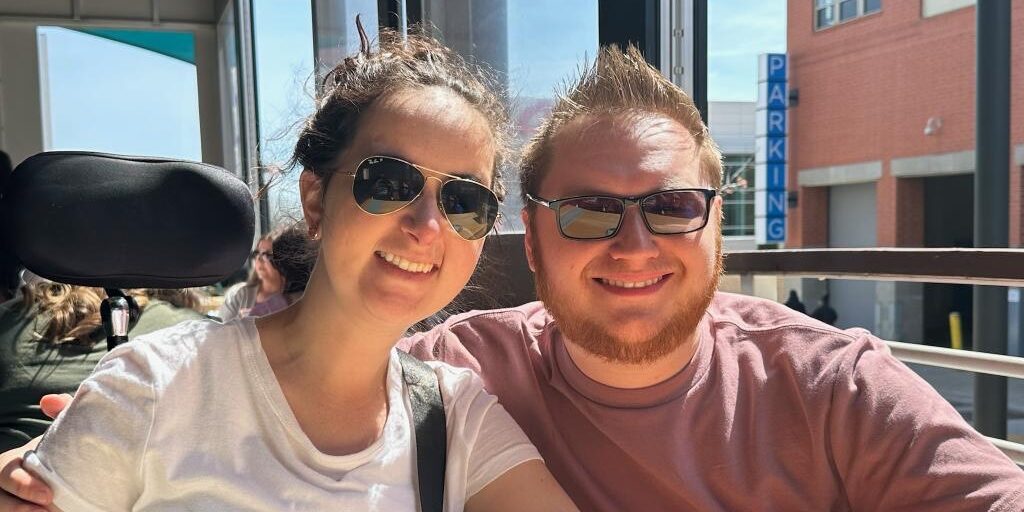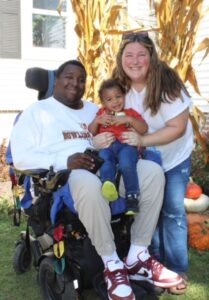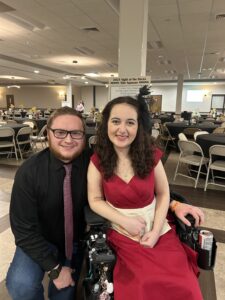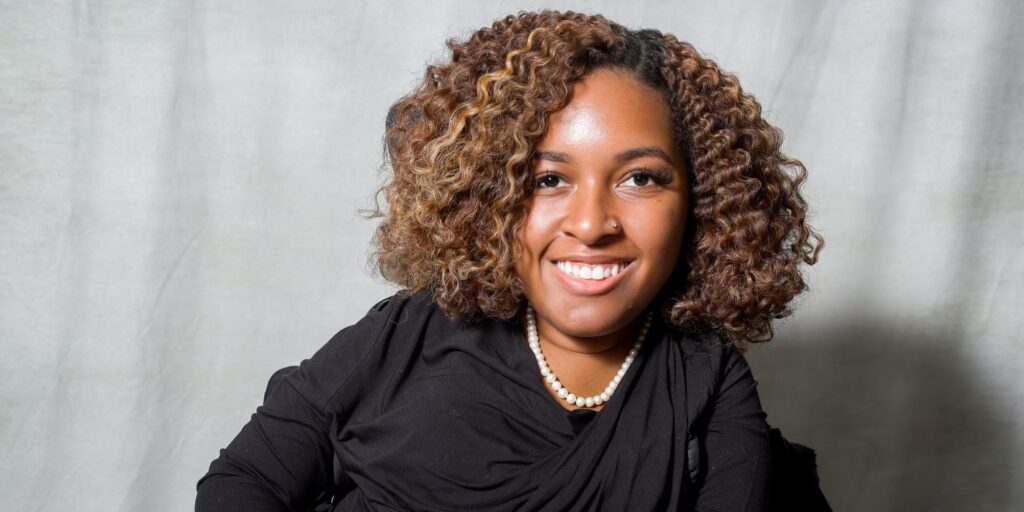
Tips for Dating a Person with a Disability
By Meredith Landry | Wednesday, October 9, 2024
When it comes to dating and relationships, people with disabilities are like everyone else — many are interested in finding romance or even a lifelong partner.
Take Abigail Phillips as an example. Throughout high school, she had a steady boyfriend. But not long before she left for college, two major things happened: that relationship ended, and she was diagnosed with Charcot-Marie-Tooth disease (CMT), which causes muscle weakness in the extremities (hands and feet, lower arms and legs). When she arrived at college, Abigail wanted to do what almost everyone at that age does: date.
“I was a basic college kid doing what college kids do, so I was always interested in dating,” says Abigail, now 24 and in graduate school in Alabama.
If you’ve ever wondered how to approach dating someone with a disability, follow these tips from people in the disability community.
1. Don’t be afraid to talk about disability.

Abigail Phillips is a graduate student in Alabama.
“Instead of avoiding the issue, I want people to ask me about my disability if they’re interested in dating me,” Abigail says. She is able to walk now but may need to use mobility devices, like a walker or wheelchair, as her CMT progresses. “If we’re going to date, they need to know what they’re signing up for,” she says.
She met her current boyfriend almost three years ago through a dating app. In her dating profile, she prominently discussed her neuromuscular condition, and when she connected with her now-boyfriend, she was open about her abilities and limitations. “I don’t want to wait until there are feelings involved before I tell someone,” she says.
Communication is key in any relationship, but it becomes even more crucial when one or both partners have a disability, says Danielle Sheypuk, PhD, a clinical psychologist in New York City, who draws from her professional experience and personal journey living with spinal muscular atrophy (SMA).
“I recommend that my patients be upfront about their disability in their dating profiles and during initial conversations,” she says.
2. Ask before you jump in to help.

Justin Lopez lives with his wife, Lexi, and their son in Ohio.
When Justin Lopez, 30, met his wife, Lexi, in college at Bowling Green State University in Ohio, he could walk up the stairs to his dorm room. But about five years into their relationship, his limb-girdle muscular dystrophy (LGMD) progressed to the point that he uses a power wheelchair full time.
“It’s been an interesting journey for us. We met when I could walk, and now I can’t,” Justin says.
Because of his diminishing mobility, Justin has had to adjust to accepting more help from others, but he still wants folks, including his wife, to ask him first if he needs the help.
“I know from an outsider’s perspective, it may look like I’m struggling, but I would rather make the attempt first, and maybe even make multiple attempts at something before I reach out for help,” Justin says. “Because when you start to rely more on individuals doing things for you, you lose your muscle memory.”
3. Don’t make assumptions.

Danielle Sheypuk, PhD, a clinical psychologist in New York City.
According to Dr. Sheypuk, one of the most important things to understand about people with disabilities is that you should not assume they are asexual or incapable of maintaining a meaningful relationship. These misconceptions can be deeply hurtful and limiting, not only for the person with the disability but also for potential relationships. It’s essential to approach dating someone with a disability with an open mind and avoid making assumptions about what the person can or cannot do.
For example, Justin encountered many people who didn’t consider him a potential father. But he and Lexi welcomed a baby boy in March 2022.
“I’ve always wanted to have kids, but most people assumed I wouldn’t be able to,” Justin says. “I’m not able to change his diaper or play catch with him, but I can help in lots of other areas. I can schedule appointments for him, make sure that we have plans for him throughout the week, make sure groceries are ordered, and do story time at night.”
4. Respect boundaries.

Olivia Holler and her boyfriend, Jacob, live in St. Louis.
Olivia Holler met her boyfriend, Jacob, in high school. Back then, Olivia, who has congenital muscular dystrophy (CMD), was able to walk about half the time. Today, seven years later, she uses her power wheelchair most of the time. At first glance, she says, many people assume that Jacob is her caregiver or friend, not her long-term partner.
“People assume that no one would willingly go out with someone in a wheelchair,” she says.
People with disabilities are often used to invasive questions and uncomfortable comments. That makes it especially important to be sensitive to their boundaries. When planning a date, it’s OK to ask about their mobility or accommodations they might need, for example, but there may be questions they don’t want to answer.
Dr. Sheypuk stresses that people with disabilities should only answer questions about their disability if they feel comfortable and want to — not because they feel they have to. And while communication is important, sometimes it’s OK to figure things out together as you go along.
After years together, Olivia’s boyfriend has become an expert at planning their excursions around St. Louis: avoid rough roads, long distances, and high-top tables, and make sure the bathrooms are accessible if they’ll be at a venue for more than an hour.
“Dating with a disability can be a struggle,” Olivia says. “I just hope everyone else can let go of their assumptions about what we can and can’t do and what we really want.”
Dating with a disability is more challenging due to social stigmas. People with disabilities often have high self-esteem in many areas of life, but not when it comes to dating. Dr. Sheypuk wants people with disabilities to remember their own worth.
“I call it ‘dateable self-esteem,’” she says. Her final advice is for anyone with a disability who has started feeling down about dating. “Go into it with confidence, accept small gestures of help if they’re appropriate, be honest and clear in your communications, and set whatever boundaries you’re comfortable with. If a potential suitor has a problem with any of that, you know they’re not the one for you.”
Next Steps and Useful Resources
- Listen to conversations with interabled couples in the Quest Podcast episode Love & Marriage.
- Learn more about forming healthy romantic relationships when one or both partners have a disability.
- Read about Cassidy Niles’ journey to becoming a mother with limb-girdle muscular dystrophy.
- Stay up-to-date on Quest content! Subscribe to Quest Magazine and Newsletter.
Disclaimer: No content on this site should ever be used as a substitute for direct medical advice from your doctor or other qualified clinician.




